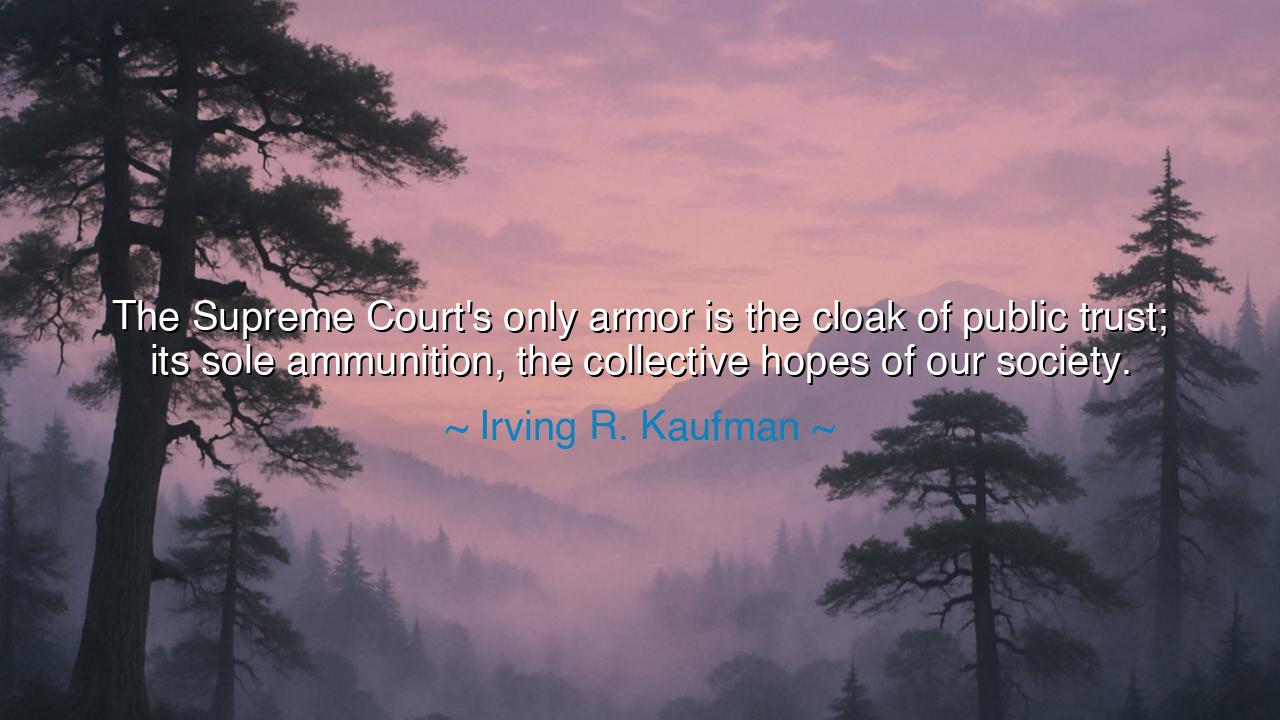
The Supreme Court's only armor is the cloak of public trust; its
The Supreme Court's only armor is the cloak of public trust; its sole ammunition, the collective hopes of our society.






In the wise and solemn words of Judge Irving R. Kaufman, we are reminded of the fragile majesty of justice: “The Supreme Court’s only armor is the cloak of public trust; its sole ammunition, the collective hopes of our society.” These words, though spoken in the measured tones of a jurist, carry the power of prophecy. They unveil a truth older than any constitution—that the might of law does not rest in weapons or walls, but in faith. For no court, however high, and no judge, however wise, can stand without the trust of the people. The robes of the just are not garments of authority—they are vestments of belief, woven from the consent and confidence of a nation’s heart.
The origin of this quote lies in Kaufman’s reflections upon the role of the judiciary in a democracy, especially the Supreme Court of the United States. Having presided over the famed Rosenberg espionage trial and witnessing the shifting tides of public opinion, Kaufman understood the peril and the privilege of wielding judicial power. His words speak from that crucible of experience: that while soldiers guard borders and politicians hold armies, the guardians of law must rely on something far more delicate—public trust. It is this trust, invisible yet mighty, that gives the court its strength, its legitimacy, and its moral command.
To call public trust the Court’s “armor” is to acknowledge that justice itself is vulnerable. Unlike kings or generals, the judiciary commands no battalions; it cannot enforce its decrees by force of arms. Its protection lies in the people’s belief that the law is fair, impartial, and sacred. When that belief falters, when corruption seeps into judgment or partisanship stains the scales, the armor cracks. For when the people lose faith in the courts, the law itself becomes but parchment—words without power, symbols without meaning.
Consider the story of Brown v. Board of Education (1954), when the Supreme Court struck down racial segregation in American schools. The decision did not wield a sword; it wielded principle. It commanded not through threat, but through moral conviction. Yet its power reshaped a nation. Why? Because enough of the people—though not all—believed in the righteousness of the law. They trusted that the Supreme Court had spoken not as a partisan voice, but as the conscience of a people struggling toward equality. That trust became the armor that defended the decision against hatred and resistance. Without it, the decree would have been dust upon the wind.
Kaufman’s second truth is just as profound: the Court’s “ammunition,” he says, is “the collective hopes of our society.” Here he reveals that justice is not a weapon of oppression, but a force of aspiration. The courts draw their strength from the dreams of the people—from their yearning for fairness, protection, and peace. Every case that reaches the Supreme Court carries with it the hopes of millions—hopes that the weak will find refuge from the strong, that the law will speak not for power, but for principle. In this way, the judiciary becomes not merely an arbiter of disputes, but a mirror of the nation’s soul.
Yet, Kaufman warns indirectly of the opposite: when the Court betrays those hopes—when rulings are seen as unjust, or when justice bends to politics—the trust that sustains it withers. The armor weakens, the ammunition fades. History bears witness to such moments. When Dred Scott v. Sandford (1857) declared that a man could be property, the Court wounded itself deeply. The people’s faith was shaken, and in time, only the fires of civil war could restore the balance. Trust, once lost, is not easily regained. The law, though written by men, must carry the breath of moral truth, or it becomes a hollow shell.
And so, my children, the lesson is this: trust is the lifeblood of justice, and justice the guardian of freedom. Every citizen, not just every judge, bears a portion of this sacred trust. Support the law when it is right; challenge it when it strays; but never cease to believe that justice can be restored through courage and conscience. For the Court, like all human institutions, is a reflection of us—its armor is our belief, its ammunition our hope.
Therefore, let us be vigilant in both faith and action. Speak truthfully, act honorably, and hold those who wear the robes of judgment to the highest standard. For if the people stand firm in their devotion to justice, then the Supreme Court, clothed in the cloak of public trust, will endure through all storms—and the collective hopes of society will remain its inexhaustible power, guiding it ever toward the light of truth and the promise of liberty.






AAdministratorAdministrator
Welcome, honored guests. Please leave a comment, we will respond soon